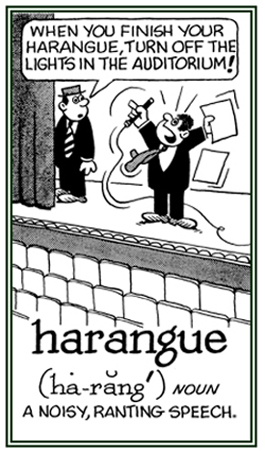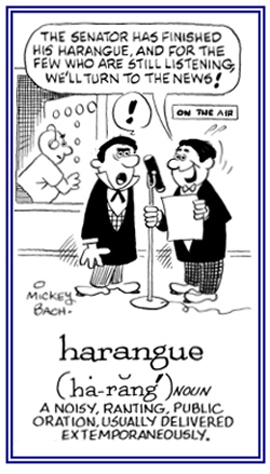You searched for:
“harangue”
1. A blustering speech with ranting that is typically given in front of an audience: The university professor delivered a long harangue about the evils of plagiarism.
2. An oration or written speech that expresses strong emotions or beliefs: Some of the radio talk-show hosts spend most of their programs presenting one harangue after another.

© ALL rights are reserved.

© ALL rights are reserved.
Go to this Word A Day Revisited Index
2. An oration or written speech that expresses strong emotions or beliefs: Some of the radio talk-show hosts spend most of their programs presenting one harangue after another.
There are all kinds of harangues; such as, those of a politician who is striving for votes or support for a legislative bill, or of a promotor who is trying to obtain money, or the lobbyist who is representing special interests, or any passionate young rebels who are trying to reform the government of their country.
3. Etymology:from [Middle English arang, "a speech to an assembly", from Old French harangue, from Old Italian aringa, from aringare, "to speak in public"; possibly from aringo, arring, "public square, meeting place", of Germanic origin.

Go to this Word A Day Revisited Index
so you can see more of Mickey Bach's cartoons.
This entry is located in the following unit:
English Words in Action, Group H
(page 2)
harangue (huh RANG) (verb), harangues; harangued; haranguing
1. To speak to a person or to others in a forceful or angry way: As a liberal talk-show host, he is constantly haranguing Republicans or conservatives with his psycho-talk.
2. To criticize or to question someone, or to try to persuade someone to do something in a forceful angry way: The politician harangued voters for their failure to support the economic stimulus plan.
2. To criticize or to question someone, or to try to persuade someone to do something in a forceful angry way: The politician harangued voters for their failure to support the economic stimulus plan.
It seems that some government legislators never tire of haranguing their fellow members either for support of their particular bills or to denounce the opposition for not giving their approval.
This entry is located in the following unit:
English Words in Action, Group H
(page 2)
A spoken or written speech that expresses strong emotions or beliefs which may be longer than normal. (2)
This entry is located in the following unit:
Word a Day Revisited Index of Cartoons Illustrating the Meanings of Words
(page 41)
